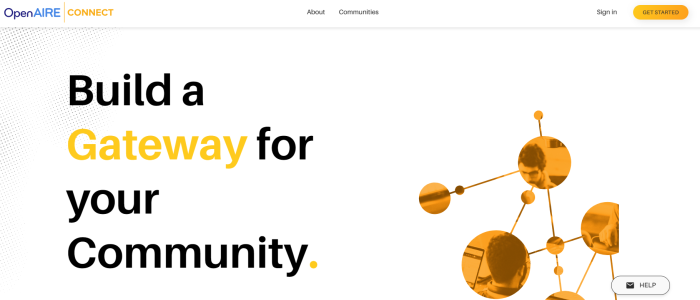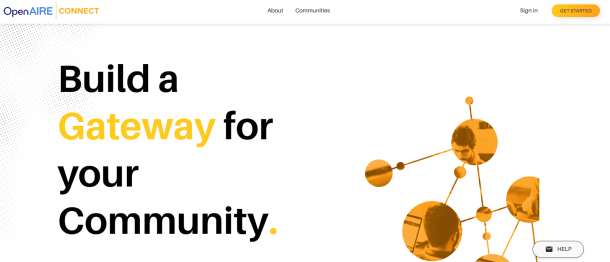Empowering research communities with OpenAIRE CONNECT
- September 26 |
- 14:15 |
- Demo Session |
- Sala de Protocolo Nouvel

Research communities, university networks, research infrastructures aim at maximizing their impact on research and society and empower their researchers with common tools, shared policies and guidelines to improve the quality of the research. However, often it is not easy to gain the deserved visibility towards funding organizations or the research staff. By analyzing the current landscape it is possible to identify a set of strategic activities:
Wide dissemination of all activities and researchers’ results within and beyond the community itself;
Tracking the research outputs of the community;
Promote Open Science practices (e.g. FAIR data and Open Access publishing) and track their uptake;
Tracking the adherence to shared policies and domain best practices;
Centralize the provision of shared services to reduce the costs and reach a higher number of users (e.g. for training programmes targeting research managers, administrators, researchers, students)
Addressing those activities in a sustainable way is in some cases not straightforward. Often, the tracking of research outcome is done manually, requiring a lot of effort for communicating with each community member (people or organisations alike), ensuring the quality and harmonizing the collected data so that it can be disseminated and/or analyzed. Another common problem is tracking the uptake of Open Science publishing practices of the researchers, identifying gaps and preparing tutorials and training to help them.
OpenAIRE, a scholarly communication infrastructure committed to the promotion of Open Science, is collaborating with several research alliances (e.g. Aurora, EUT+, EUTOPIA, FIT FORTHEM), research infrastructures (e.g. EMBRC, IPERION-HS, DARIAH) and domain specific communities (e.g. marine science, neuroinformatics) to address those challenges. From the technical point of view, OpenAIRE operates the CONNECT service (https://connect.openaire.eu), through which each community can have a customizable gateway where all research products of the community can be discovered via a single entry point and services to ease the adoption and tracking of Open Science practices. From the training point of view, the collaborations give us the opportunity to enrich and exchange training material, expertise, and set up a joint dissemination strategy to further improve the visibility within the communities, the OpenAIRE network, and beyond.
The demo will present one of the public gateways to show all the built-in functionalities available to users: search and browse research outputs, link them with each other and project grants, search for Open Access repositories to deposit any type of research products. It will also present the administration dashboard that can be used by the community curators to configure the gateway in terms of content and look&feel.
Organisations involved
Presenters
-

Alessia Bardi
Alessia Bardi is a Researcher in computer science at the Institute of Information Science and Technologies of the Italian National Research Council with a PhD in Information Engineering. Her research activities focus on infrastructures for scholarly communication, Open Science and metadata aggregation. She is member of the team that maintains the D-Net software toolkit, used for the realisation of aggregative infrastructures for different research communities (e.g. archeologists, epigraphists, historians). She is co-chair of the GOFAIR Discovery Implementation Network and she is actively working on the OpenAIRE infrastructure as service manager of OpenAIRE CONNECT, which offers customizable discovery portals for research communities, and as member of the technical team that delivers the OpenAIRE Graph. -

Miriam Baglioni
Miriam Baglioni works as a researcher at Networked Multimedia Information Systems (NeMIS) Laboratory of the Italian National Research Council - Institute of Information Science and Technologies (CNR-ISTI). She graduated in Computer Science with honors, and received her PhD in Computer Science from the University of Pisa. She was involved in the EU funded projects BRITE, MUSING, and GeoPKDD, OpenAIRE2020, and in the projects ClickWorld, Dantex, TetraModel and BiNet. She is currently collaborating at the EU funded projects, FAIRCORE4EOSC and SciLake. She has worked on data mining, knowledge discovery, ontologies, social networks and bioinformatics. Her current research interests include data einfrastructure for science, and science reproducibility.
